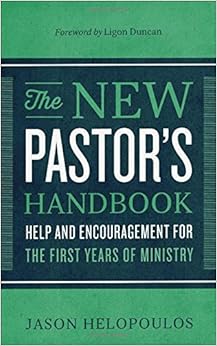 In addition to being a great friend and associate pastor, Jason Helopoulos is a fine writer who has written another excellent book. If you’ve read Jason’s earlier book on family worship or any number of his popular posts on this site, you know that his writing is inevitably pastoral, practical, and accessible. This book is no exception.
In addition to being a great friend and associate pastor, Jason Helopoulos is a fine writer who has written another excellent book. If you’ve read Jason’s earlier book on family worship or any number of his popular posts on this site, you know that his writing is inevitably pastoral, practical, and accessible. This book is no exception.
The New Pastor’s Handbook: Help and Encouragement for the First Years of Ministry (Baker) is exactly the sort of book I wanted to read when I was starting out in the ministry. With 48 bite-sized chapters on topics like calling, candidating, reading, using your time wisely, busyness, thankfulness, visitation, discontentment, discouragement, envy, and the privilege of ministry, I’m sure every pastor (of any age) can be helped and encouraged by this book. Interested church members who spend even a half hour in these pages will get a feel for the unique challenges and joys of pastoral ministry.
To give you a sense of what Jason is up to , I’ve pasted chapter 16 below. It’s entitled “Lose Control: Equip the Saints.”
On the heels of chapter 15, this chapter title might strike you as contradictory to my previous discussion about leadership. However, it is essential that these two chapters be understood as complementary and equally necessary. As a pastor, you have to lose control. Perhaps many of you are ready to turn the page and skip to the next chapter. You are a natural leader and have sought leadership opportunities your entire life. You know, love, and thrive on control. Hearing someone say “Lose control” seems foolish.
However, losing control is the very thing that we must do in the pastorate. When I say, “Lose control,” I don’t mean that we should stop leading. As I discussed in the previous chapter, our local church needs leadership; pastors are to lead. However, we don’t need to lead everything. Moses learned this lesson from his father-in-law, Jethro (Exod. 18), and it is a lesson that many of us can apply as well. Seeking to control all the decisions, ministries, and programs of the local church will kill you, your church, and your ministry. You will burn out, your church will become immature, and people will stop following. Lose some control and be at peace with it. In truth, the ability to let go points to good leadership.
We are “pastors and teachers” (Eph. 4:11 ESVmg.), and our duty does not include controlling everything. Rather, our duty is to “equip the saints for the work of ministry” (Eph. 4:12). We are failing if our ministry does not equip the saints and provide them with the opportunity to use their gifts. Mature pastoral leaders entrust others with areas of responsibility.
Likewise, we shouldn’t personally jump to meet every ministry need. If we fill the void on every occasion, others will never step up. The pastor who complains that his elders never visit anyone in the hospital but is at the bedside of every congregant before their anesthesia has worn off is the cause of his own complaint. He is too controlling, and his church suffers as a result. If you serve a church of a few hundred or more, you probably won’t know everyone, and you surely can’t personally minister to everyone. Let that be all right. Trust that the Lord will use other dear brothers and sisters in the church. We equip the saints to serve and minister to one another. We don’t have to do it all. In fact, we shouldn’t do it all.
The wise pastor understands that no matter how much he may “feel” in control, the reality is that he has very little control indeed! We serve a sovereign God and have been given the privilege of serving as undershepherds, but we are not the Shepherd. He is. The more clearly we realize this, the more readily it will be expressed in our actions and philosophy of ministry as we seek to empower others and “lose control.”
The New Pastor’s Handbook has nice blurbs from Albert Mohler, Alistair Begg, Bob Bouwer, Burk Parsons, Joe Thorn, Aubrey Malphurs, and Tim Challies, plus a 5-page Foreword from Ligon Duncan. Check out the book and see if there isn’t plenty of “help and encouragement for the first years of ministry.”


















